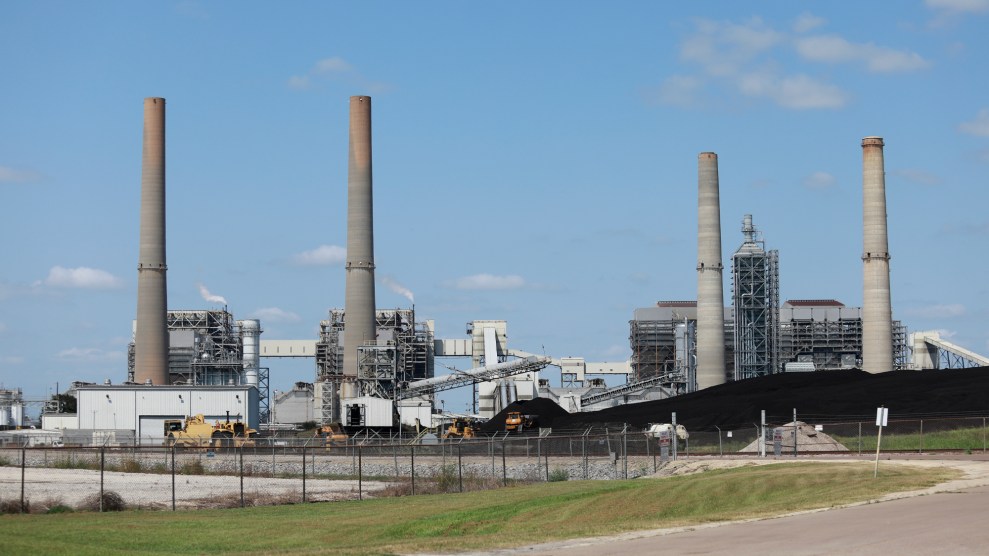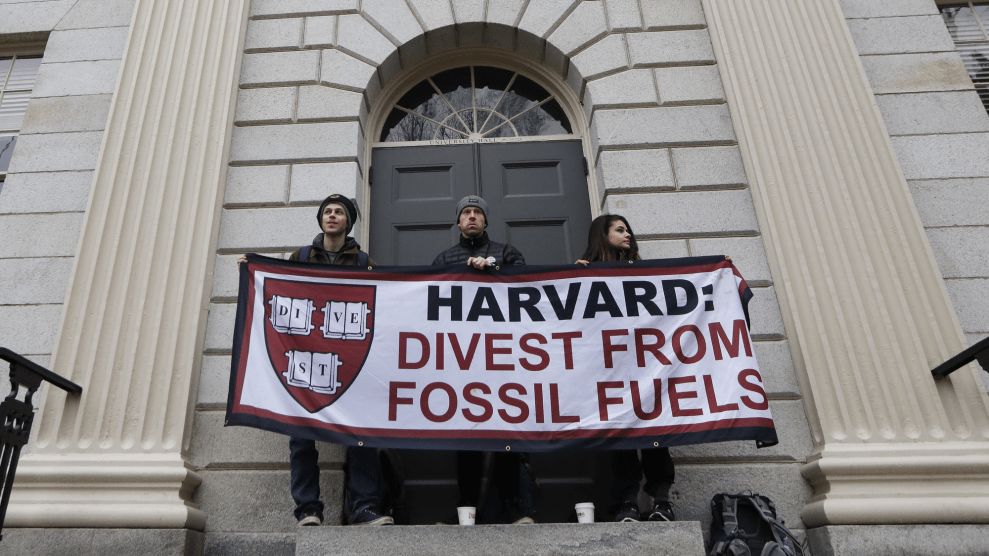
WA Parish Generating Station, a natural gas and coal power plant, in Fort Bend County near Houston, Texas. Reginald Mathalone/NurPhoto/ZUMA
This story was originally published by the Guardian and is reproduced here as part of the Climate Desk collaboration.
Fossil fuel companies’ funding of universities’ climate-focused efforts is delaying the green transition, according to the most extensive peer-reviewed study to date of the industry’s influence on academia.
For the study, published in the journal WIREs Climate Change on Thursday, six researchers pored over thousands of academic articles on industries’ funding of research from the past two decades. Just a handful of them focused on oil and gas companies, showing a “worrying lack of attention” to the issue, the analysis says.
But even that small body of research shows a pattern of industry influence: “The academic integrity of higher education is at risk,” they write.
During the past two decades, non-profits, campus organizers and a small group of scholars have sounded the alarm about oil companies’ influence in academia, drawing parallels to tobacco, pharmaceuticals and food producers who have also funded scholarship.
In the new study, researchers found that out of roughly 14,000 peer-reviewed articles about conflicts of interest, bias and research funding across all industries from 2003 to 2023, only seven mentioned fossil fuels. When the authors broadened their search to look at book chapters, they found only seven more.
An influential 2011 MIT report whose authors had ties to the fossil fuel industry “helped to situate natural gas, or fossil gas, as part of the climate solution.”
But even by combing through the small body of existing scholarship, the authors identified hundreds of instances in the US, UK, Canada and Australia where oil and gas interests had poured funding into climate and energy research while sitting on advisory or governing boards, endowing academic posts, sponsoring scholarships, advising curricula or otherwise influencing universities.
“We find that universities are an established yet under-researched vehicle of climate obstruction by the fossil fuel industry,” the authors write.
The analysis found that oil companies have long influenced universities to focus on climate efforts that would enshrine a future for fossil fuels, despite experts’ repeated warnings that the world must stop burning coal, oil, and gas to avert the worst climate impacts.
“The science has been telling us that fossil fuel phase-out is the No. 1 thing that we need to focus on, but within our universities, there’s very little research on how to do fossil fuel phase-out,” said Jennie Stephens, a climate justice professor at Maynooth University in Ireland and study co-author. “This provides some explanation for why society has been so ineffective and inadequate in our responses to the climate crisis.”
Fossil fuel companies’ relationships with universities can create the potential for bias in research and real or perceived conflicts of interest, the authors write.
“Our intention is to protect scientific integrity,” said Geoffrey Supran, a University of Miami associate professor who studies fossil fuel industry messaging and co-authored the study. “We want to warn scholars and university leaders that they can be pawns in a propaganda scheme.”
BP, for instance, funneled between $2.1 million and $2.6 million to Princeton University’s Carbon Mitigation Initiative between 2012 and 2017. The initiative produced research on ways to decarbonize the economy. “It’s noteworthy of that the scenarios for decarbonization that the initiative outlined, only one of them didn’t include a serious role to be played by fossil fuels paired with negative emissions technologies,” said Supran.
The study highlights an internal 2017 campaign-strategy memo presented by a public relations firm to BP that proposed targeting Princeton as a “partner” that could help authenticate “BP’s commitment to low carbon” despite its commitment to expanding planet-heating fossil fuel production.
In another example, an influential 2011 study from the MIT Energy Initiative called gas “a bridge to a low carbon future” even though it is a planet-heating fossil fuel. Several of the study’s authors had financial ties to, and funding from, major oil and gas companies.
“The report helped to situate natural gas, or fossil gas, as part of the climate solution,” said Stephens. “And it seemed to reinforce the Obama administration’s all-of-the-above strategy,” she added, referring to the former president’s commitments to supporting both fossil fuels and renewables.
A spokesperson for the MIT Energy Initiative said funders “have no control” over the institute’s reports: “no approval or rejection, no opportunity to accept or reject any findings.” He added that the study in question was “developed and vigorously debated by a multidisciplinary team.”
In an earlier example, the study notes that in 1997, Exxon paid a Harvard Law School professor to write about “why punitive damages awards are inappropriate in today’s civil justice system” as the company was appealing a $5 billion punitive damages award following a major oil tanker spill in Alaska.
Fossil fuel companies had donated at least $700 million to US universities in the decade prior, a 2023 study found.
Reached for comment, a spokesperson for the US fossil fuel lobby group American Petroleum Institute said: “America’s oil and natural gas industry will continue to work with experts and organizations committed to advancing solutions that tackle climate change, meet growing demand and ensure continued access to affordable, reliable American energy.” The Guardian also contacted BP, Exxon, Princeton, and Harvard ; none were immediately available for comment.
There is some evidence that funding from oil and gas companies is associated with a more positive view of fossil fuels, the study notes. And relationships with polluting energy companies can also affect internal campus decision-making, the authors argue.
Universities that are dependent on fossil fuel funding, for instance, may be less likely to divest their endowments from the sector, said Supran.
Despite the authors’ efforts, the scope of fossil fuel funding on campus remains unclear because the vast majority of university research centers do not disclose their donors publicly. One 2023 report from the nonprofit Data for Progress found that fossil fuel companies donated at least $700 million to 27 US universities over the past decade, but the authors noted this was almost certainly an undercount.
Universities have sometimes pushed back on calls for transparency. Years ago, one of the new study’s co-authors, Emily Eaton, requested that her university in Canada disclose its fossil fuel funders; when it refused to do so, she took it to court, and in 2021 a judge ruled in her favor.
The report comes amid increasing public scrutiny of the oil sector’s relationship with universities, including in an April report from Democrats on Capitol Hill. Efforts to push academic institutions to “dissociate” from fossil fuel companies are also ramping up on campuses across the country.
“This literature review confirms what students in our movement have known for years,” said Jake Lowe, executive director of Campus Climate Network, which is pressuring schools to sever ties with the industry. “Big oil has infiltrated academia in order to gain undue credibility and obstruct climate action.”
To avert these conflicts in the future, Stephens said governments should provide more public funding to universities. “More public funding could help them act in the public good,” she said.
















